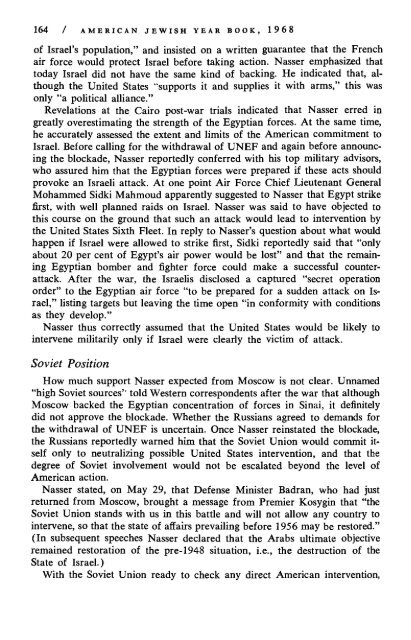1968_4_arabisraelwar
You also want an ePaper? Increase the reach of your titles
YUMPU automatically turns print PDFs into web optimized ePapers that Google loves.
164 / AMERICAN JEWISH YEAR BOOK, <strong>1968</strong><br />
of Israel's population," and insisted on a written guarantee that the French<br />
air force would protect Israel before taking action. Nasser emphasized that<br />
today Israel did not have the same kind of backing. He indicated that, although<br />
the United States "supports it and supplies it with arms," this was<br />
only "a political alliance."<br />
Revelations at the Cairo post-war trials indicated that Nasser erred in<br />
greatly overestimating the strength of the Egyptian forces. At the same time,<br />
he accurately assessed the extent and limits of the American commitment to<br />
Israel. Before calling for the withdrawal of UNEF and again before announcing<br />
the blockade, Nasser reportedly conferred with his top military advisors,<br />
who assured him that the Egyptian forces were prepared if these acts should<br />
provoke an Israeli attack. At one point Air Force Chief Lieutenant General<br />
Mohammed Sidki Mahmoud apparently suggested to Nasser that Egypt strike<br />
first, with well planned raids on Israel. Nasser was said to have objected to<br />
this course on the ground that such an attack would lead to intervention by<br />
the United States Sixth Fleet. In reply to Nasser's question about what would<br />
happen if Israel were allowed to strike first, Sidki reportedly said that "only<br />
about 20 per cent of Egypt's air power would be lost" and that the remaining<br />
Egyptian bomber and fighter force could make a successful counterattack.<br />
After the war, the Israelis disclosed a captured "secret operation<br />
order" to the Egyptian air force "to be prepared for a sudden attack on Israel,"<br />
listing targets but leaving the time open "in conformity with conditions<br />
as they develop."<br />
Nasser thus correctly assumed that the United States would be likely to<br />
intervene militarily only if Israel were clearly the victim of attack.<br />
Soviet Position<br />
How much support Nasser expected from Moscow is not clear. Unnamed<br />
"high Soviet sources'' told Western correspondents after the war that although<br />
Moscow backed the Egyptian concentration of forces in Sinai, it definitely<br />
did not approve the blockade. Whether the Russians agreed to demands for<br />
the withdrawal of UNEF is uncertain. Once Nasser reinstated the blockade,<br />
the Russians reportedly warned him that the Soviet Union would commit itself<br />
only to neutralizing possible United States intervention, and that the<br />
degree of Soviet involvement would not be escalated beyond the level of<br />
American action.<br />
Nasser stated, on May 29, that Defense Minister Badran, who had just<br />
returned from Moscow, brought a message from Premier Kosygin that "the<br />
Soviet Union stands with us in this battle and will not allow any country to<br />
intervene, so that the state of affairs prevailing before 1956 may be restored."<br />
(In subsequent speeches Nasser declared that the Arabs ultimate objective<br />
remained restoration of the pre-1948 situation, i.e., the destruction of the<br />
State of Israel.)<br />
With the Soviet Union ready to check any direct American intervention,


